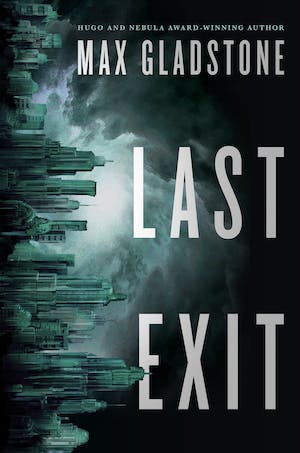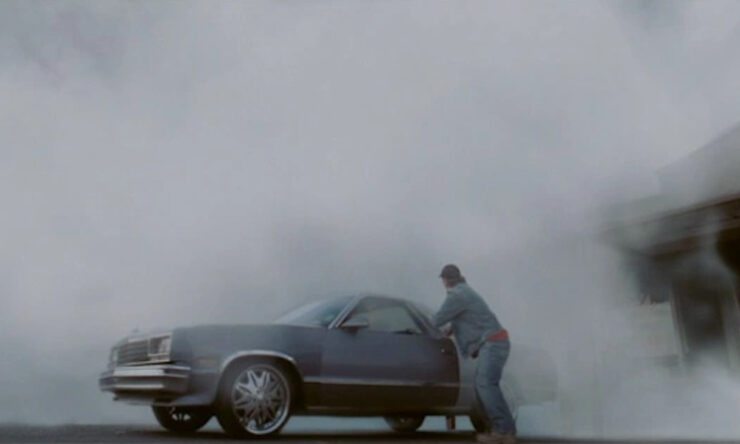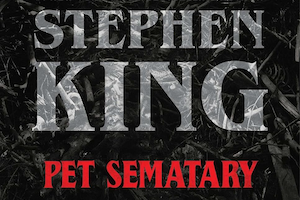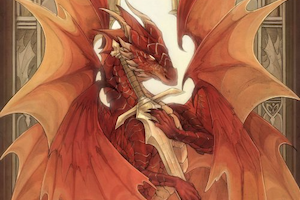Welcome back to Reading the Weird, in which we get girl cooties all over weird fiction, cosmic horror, and Lovecraftiana—from its historical roots through its most recent branches.
This week, we continue Max Gladstone’s Last Exit with Chapters 15-16. The novel was first published in 2022. Spoilers ahead!
Summary
“You dug irrigation ditches in your soul to channel your fear, to guide it to useful work.”
June hitched out of the hotel parking lot grasping Zelda’s hand, but she’s landed alone atop a grass-encircled hill. Overhead, the stars are “so deep, so dense, so different,” but the earth stretches away in empty darkness. She’s read that when you’re lost, you should wait to be found, but that assumes your companions aren’t also lost. Zelda said if separated to make for the Medicine Wheel, where worlds touch. Head south and west. It will call you.
June descends the hill. She’s hitched only once, while Zelda and her friends have done it hundreds of times. She’s been among them as a guest, Zelda’s student, Sal’s little cousin. But Zelda’s accepted her. Zelda’s the one who never left the road. Maybe the darkness has gotten Sal, but at least Sal didn’t flinch, and June won’t either.
She knows enough not to focus inward when trying for spin. The mind’s a prison of preconceptions. Focus outward at the world: don’t know what you’ll see beforehand, and the world will lead you somewhere unexpected.
Where it leads June is into intensifying moonlight, grass bobbing in multicolored waves. She thinks the shadows must soon fade, then realizes no amount of light can banish them. The shadows hold secrets. When she reaches for them, they reach back, and she hears distant music and voices. The shadows ask what she wants. She answers that she wants to be taken to her friends. Darkness enfolds her. She slips through it from alt to alt, shadows urging her ever further. As worlds shift, however, she hears Sarah’s voice, glimpses her and Ish far away and small. Her hand parts the barrier, and Sarah says, “Sal?”
June’s voice is crashing waves and screams. Her outstretched hand drips wriggling shadows. Ish attacks her; she grabs his arm with shadowy claws that score him deep, then reverts to herself. Ish apologizes, but says that when June entered their alt, she was covered with rot, waving too many arms. Like Sal.
They debate whether June’s “knack” might involve using the rot for her own purposes instead of the rot using her. Ish is skeptical. Sarah says that their knacks are shaped by what each alt-rider needs, what they want. June admits she wants Sal back. That’s what Ish was afraid of.
June and Sarah bed down while Ish stands watch. June asks for the story of how the friends set off for the crossroads. Sarah explains how they combined math and magic and their “young and eager faith” to start a journey that would change the world around them. In the end, they failed.
* * *
As Ramon and Zelda rest on a ruined rooftop, he contemplates how the friends came together at Yale. Fate or chance? A necessary gravitation? He remembers standing on the highest tower on campus with Sal—Sal always loved heights—and talking about her relationship with Zelda. He advised Sal to admit that she too was worried about not fitting in, that they were both fallible but having each other might be enough. He recalls teaching Zelda to drive the Challenger, and how one day she took a turn that didn’t exist into a world of dinosaurs.
They walk toward the camp they spotted earlier, hoping to steal a vehicle. Ten miles there, ten years apart to talk over. Zelda admits that she doesn’t always succeed in destroying rot and healing inter-alt rifts. When she fails, people disappear, even whole towns. Ramon talks about his struggle with drugs, his escape from corporate America, meeting Gabe. At last Zelda asks the burning question: “You don’t hate me?” Ramon had expected to hate her, after the crossroads catastrophe, but he answers: “Of course not. You showed me my first dinosaur.”
Ramon suggests they simply ask the camp inhabitants if they can borrow a car. Zelda doesn’t argue—sooner or later Ramon will remember how things work out in the alts. A closer look at the tank traps and staked skulls ringing the huts rules out civility, as do perimeter guards whose mouths have been stitched shut. After nightfall, the encampment quiets down, but the skulls’ eye-sockets glow red as they rotate like magical security cameras.
Ramon’s knack for finding safe passage gets them into the camp unseen. Zelda’s knack complements his by “sliding chance into more comfortable paths.” They find grotesquely modified motorbikes and a gigantic “Frankencar” welded together from trucks, tanks, even a missile platform. A corpse lies on an altar by the dying bonfire. Next to it, battered and blood-splashed, stands the Challenger. Ramon forgets stealth in hurrying toward his car, and a neo-barbarian sounds the alarm.
Luckily for Ramon and Zelda, the Challenger runs a lot better than it looks. Guards pursue on “buzz-saw bikes” along with a bloody-mouthed priest aboard the Frankencar. Zelda hitches into a new alt where the road runs through lava fields, but they’ve drawn their pursuers along with them. The bikes meet fiery ends. The Frankencar bears down, inexorable.
Because things couldn’t possibly get worse, beyond-Sal appears as a pillar of black cloud trailing lava-storms like a “bridal train.” Zelda grabs the steering wheel and sends the Challenger off the road. Instead of splashing into magma, it drops into a parking lot dotted with human-shaped algae blobs. No one’s followed them, and they’re alive and laughing with reaction. They’re no longer young, “bound for a good war,” but they’re still here.
Then Zelda spots thin black lines bisecting stars and moon. There are cracks in the sky, again.
This Week’s Metrics
What’s Cyclopean: June complains about Zelda’s tendency to explain alt-travel in weird metaphors. She’s also the one who compares the voices of shadows to a glass harmonica. Zelda, in a less-than-poetic moment, suggests her rot-fixing is like a plumber repairing her own effluent-storm of broken pipes.
Libronomicon: Zelda, getting back into the swing of alt-travel in company, tells herself that the separated party is “only temporarily inconvenienced, like people on adventures in books.” Very meta.
Weirdbuilding: June compares alt-travel—the need to look outward for uncertainty—to literary “Jedi stuff” magic that requires you to become more sure, more inward-focused.
Anne’s Commentary
I’ve never been a fan of the Mad Max movies or of similar post-apocalyptic SFF in which the tattered remnants of humanity belong to two groups: Neo-barbarians obsessed with automotive mayhem and power-tool weapons; and their victims/occasional saviors (also usually equipped for automotive and power-tool mayhem.) One or more of Gladstone’s alt-riders must be big-time into the franchise, though. That’s assuming their imaginations play a part in the alts they “hitch” into, many of which would make the ultimate destination for Wasteland Weekend.
Or, still more depressing, the number of Maxian alts may indicate that humanity has a real propensity under existential stress to deteriorate into rusty, clanking, gas-guzzling savagery. What it will come to when the fossil fuels and leather-bearing animals are gone… well, there must be alts expressing all the dusty-gory possibilities.
Mustn’t forget, though. Another frequent stop for the alt-riders is a world populated by dinosaurs. I guess that here the Cretaceous-Paleogene extinction event of 66 million years ago never took place and so the dinosaurs didn’t surrender dominance to mere rodents and their descendants. It’s the rare positive alt-outcome. Who wouldn’t prefer dodging Triceratops to Frankencars? Ramon can forgive Zelda all her sins because she took him to Cretaceous Park as well as to Security Cam Skulls Land.
(Security Cam Skulls are cool, though. I would buy one, or a dozen. On the other hand, the guards with stitched-up lips bother me. How do they eat, or brush their teeth, or expectorate forcefully to show their contempt for the good guys? The evil overlord of this gang obviously hasn’t thought things through.)
I’m starting to like June best of this book’s characters. By separating her from the other alt-riders, Chapter Fifteen drops the POV spotlight squarely on her, and she proves more than capable of owning it. As June sees it, she doesn’t have the others’ experience with the road, but “her whole life had been off the map,” which “had to count for something.” It’s given her impressive maturity, both in practical agency and more abstract thinking. She can admire Zelda for sticking to the road, keeping faith with her convictions while her friends deserted. She can admire Sal, however fallen, for having had the guts to go “out beyond the edge of the firelight circle, where people were changed.” But she also realizes the potential cost of change that radical. People thought they wanted God to speak to them, but those who really heard God’s Word “were broken open and pulped by the Word…anything that wouldn’t pulp you wasn’t the Word.” And so you could pray, “God, save me from God.” You could want the mystical agony-ecstasy of being burned, but fear consumption. You could want to stick to the symbolism of sacrifice, the sacrament, rather than sacrifice itself, to “stay a sturdy little wafer, a cup of too-sweet wine.”
Or you could accept that your personal process for alt-travel required stepping into the darkness beyond the light. Instead of waiting for the shadows to yield to light, you could reach for them, for every “moonshadow” that “twitched, uncurled, lengthened, put off new shoots as whip thin as centipede legs.” You could slip through shadow “like a fish through a stream,” and, instead of going “just a little further” as the shadows tempted, you could step out among the friends you sought.
Too bad the friends would mistake you for the beyond-Sal they’ve come to fear, because you too emerge wearing black rot, sporting too many arms, your face “darkness straight through. Like the night was moving.”
Sarah can entertain the idea that using “rot” (“shadow” to June) could be the girl’s unique knack, shaped like all their knacks by what she most wants and needs. Ish is skeptical—what could June want that “rot” can provide? June tells him the truth: She wants Sal back. And, as June later tells herself, she wants to save them all, Sal and Zelda, Sarah and Ramon and Ish.
No, not wants to save. June’s “gonna save them all.”
There’s a mission worthy of a cosmic-level Jeanne d’Arc! I’ve got to love June for embracing it, and I’ve got to be terribly afraid for her at the same time.
Ruthanna’s Commentary
Mad Max races across lava fields don’t sound like my idea of a good time, but clearly Ivy League students are different. June gets the appeal, though: “monsters you could fight and sometimes beat”. The alts are full of pulp-trope apocalypses that tie up neatly—until they aren’t.
Neil Gaiman has a quote: “Fairy tales are more than true: not because they tell us that dragons exist, but because they tell us that dragons can be beaten.” Zelda and company, though, have learned the difference between “can” and “will”, between “sometimes” and “inevitably”. June knows that lesson well, but is jealous of the illusion—however tenuous and temporary. It may be the only thing “better” about the worlds they’ve found.
At least part of alt-travel depends on what you believe possible, or rather on what you don’t believe is impossible. Have they found only monster-ful worlds where monsters can be beaten because that’s the limit of their optimism? Because they imagined overcoming villains rather than imagining what an actual better world might look like? Or were these alts always there to find, horrific possibilities slipping through into the imaginations of B-movie producers throughout the 20th century?
June, out on her own, does something that Ish and Sarah thought impossible: she works with the rot without—it seems—becoming permanently corrupted. The inevitable cordyceps metaphor comes up. But while parasitic mind-control fungus is real, so are mycelial networks that break down the dead and turn them into mulch for new life, that carry nutrients and information across forests. And those networks may sprout fruiting bodies (that’s the mushroom part) that look slimy, disturbing… rotten.
So which of those describes the rot, really? It feels like June has just learned something important, but it’s not clear what.
Ramon recalls commiserating with Zelda about being a first-generation college student, not knowing what it’s possible to ask for. Getting an extension feels like a cheat code, wild as moving between universes. But for alt-travel they’re all first-generation students, unclear even after their initial travels what possibilities lie open to them. June’s discovery doesn’t come with a convenient professor to explain the boundaries.
June complains that Zelda describes alt-travel with “weird metaphors,” but they all do that. Magic or math or science, discovery of what’s already out there or shaped by belief—they don’t know. And not understanding the multiverse—that’s tangled with how little they understand about their own world, about themselves, about each other. Sal, young and “fronting” the world with the appearance of confidence, has “more fronts than the Second World War.” There’s so much carried by that pun. Sal’s facades create a battle front with every obstacle in her way; Sal-as-student wants contacts who can provide all the keys to all the front (and back) doors; Sal-as-rot creates “fronts” through the million cracks in the world. And June takes after her: her insomnia is “a flipbooks of crisis,” all the fronts that require action. All the ways the world requires saving.
Alt-travel requires uncertainty, and that can make it feel like uncertainty is the only thing that’s real. Ramon wrestles with this: the Challenger’s claim that only the grit and blood of the road are real, his love and comfort with Gabe mere surface illusion. This comes right after a long section about how Zelda an Sal needed to acknowledge their love—their mutual small-lost-person humanity—over their need to put each other on heroic pedestals. It never happens in their college years: Zelda needs Sal big as the sky, and that’s what she gets.
Maybe they can’t find “better” until they take the grit and blood of adventure down from their pedestals. Until they allow the good parts—even if less adrenaline-charged than a Mad Max car chase—to be real too.
Next week we celebrate the turning season with a selection from Autumn Cthulhu: Gemma Files’s “Grave Goods”.














